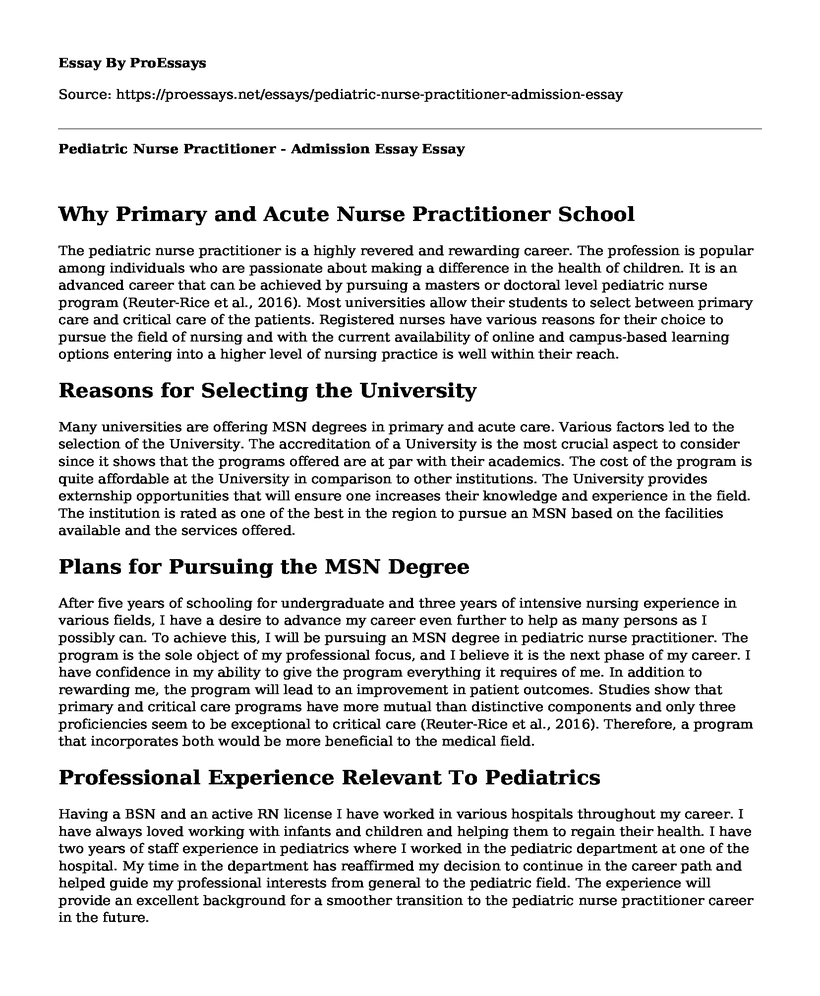Why Primary and Acute Nurse Practitioner School
The pediatric nurse practitioner is a highly revered and rewarding career. The profession is popular among individuals who are passionate about making a difference in the health of children. It is an advanced career that can be achieved by pursuing a masters or doctoral level pediatric nurse program (Reuter-Rice et al., 2016). Most universities allow their students to select between primary care and critical care of the patients. Registered nurses have various reasons for their choice to pursue the field of nursing and with the current availability of online and campus-based learning options entering into a higher level of nursing practice is well within their reach.
Reasons for Selecting the University
Many universities are offering MSN degrees in primary and acute care. Various factors led to the selection of the University. The accreditation of a University is the most crucial aspect to consider since it shows that the programs offered are at par with their academics. The cost of the program is quite affordable at the University in comparison to other institutions. The University provides externship opportunities that will ensure one increases their knowledge and experience in the field. The institution is rated as one of the best in the region to pursue an MSN based on the facilities available and the services offered.
Plans for Pursuing the MSN Degree
After five years of schooling for undergraduate and three years of intensive nursing experience in various fields, I have a desire to advance my career even further to help as many persons as I possibly can. To achieve this, I will be pursuing an MSN degree in pediatric nurse practitioner. The program is the sole object of my professional focus, and I believe it is the next phase of my career. I have confidence in my ability to give the program everything it requires of me. In addition to rewarding me, the program will lead to an improvement in patient outcomes. Studies show that primary and critical care programs have more mutual than distinctive components and only three proficiencies seem to be exceptional to critical care (Reuter-Rice et al., 2016). Therefore, a program that incorporates both would be more beneficial to the medical field.
Professional Experience Relevant To Pediatrics
Having a BSN and an active RN license I have worked in various hospitals throughout my career. I have always loved working with infants and children and helping them to regain their health. I have two years of staff experience in pediatrics where I worked in the pediatric department at one of the hospital. My time in the department has reaffirmed my decision to continue in the career path and helped guide my professional interests from general to the pediatric field. The experience will provide an excellent background for a smoother transition to the pediatric nurse practitioner career in the future.
The Rationale for the Specialty Selected and Future Career Goals
The pediatric nursing practice has a unique position in the advance practice of nursing as a career in the U.S (Reuter-Rice et al., 2016). The profession provides a family-centered and socially courteous healthcare for pediatric clients who have intricate, life-threatening and chronic illness in various care settings. The career will offer the opportunity to work with a team that is multiple skilled professions to ensure that the highest quality of evidence-based healthcare is provided to toddlers, children, and adolescents who have life-threatening conditions. CPNP-AC allows an opportunity where an individual can develop in their career in the medical field extensively (Reuter-Rice et al., 2016).
University Influence on the Decision
MSN-level pediatric nurse practitioner degree program offers the option of specializing in acute or primary care. The University provides an MSN in both care programs which increases the flexibility of the profession and thus an excellent choice for career advancement. Additionally, it gives an opportunity for part-time or full-time study in addition to both online and on-campus classes. The program increases flexibility making it easier to make the decision.
References
Reuter-Rice, K., Madden, M. A., Gutknecht, S., & Foerster, A. (2016). Acute care pediatric nurse practitioner: The 2014 practice analysis. Journal of Pediatric Health Care, 30(3), 241-251. https://www.jpedhc.org/article/S0891-5245(16)00048-1/pdf
Cite this page
Pediatric Nurse Practitioner - Admission Essay. (2022, Jul 15). Retrieved from https://proessays.net/essays/pediatric-nurse-practitioner-admission-essay
If you are the original author of this essay and no longer wish to have it published on the ProEssays website, please click below to request its removal:
- Livestock Industry and Its Employment Opportunities - Report Example
- Research Paper on Involving Fire Suppressants
- Essay Example on Organ Trafficking in Egypt: They Locked Me In and Took My Kidney
- Paper Example on ANA Code of Ethics: A Guide to Professional Practice in Healthcare
- Essay Example on HRM Strategies: Driving Organizational Success Through Employee Performance
- Children's Health: Vaccine Policies and Beyond - Essay Sample
- Pandemic Worsens Political Confusion: Effects on Governments - Essay Sample







